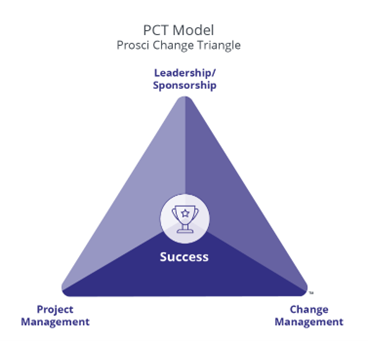Applying The Project Change Triangle Model
18 August 2023
Article written by Emma de-la-Haye
18 August 2023
Article written by Emma de-la-Haye
In 2006, Prosci released a model to enable its change practitioners to take the pulse across a set of indicators to give a broad sense of whether an organisation was headed for success in each change project. At that time called the Project Change Triangle, the PCT Model quickly became one of the “most reached for” tools in the Prosci change practitioner’s toolkit; a simple and easy to understand scoring framework, which gave us practitioners a health check, or pulse check, on a change project with results utilising a familiar traffic-light red-amber-green output.
We found the PCT Model quick to use once we became accustomed to it. Having trained thousands of change practitioners, my experience was that the PCT Model, taught on day one of the Prosci three-day certification programme, was invariably the moment when student practitioners sat forward in their seats, began nodding their heads and taking lots of notes; I could see the PCT Model resonating with them.
Fast-forward 15 years, and as part of the enhancement to its methodology, Prosci augmented the PCT Model: we renamed the Model to the Prosci Change Triangle as a reflection that not all organisational changes are managed as projects and added a fourth aspect - success - to be evaluated alongside the original three aspects of leadership/sponsorship, project management and change management.
The success aspect focuses on areas including whether the organisational benefits of the change have been defined and whether units of measurement for benefits and objectives have been established. The PCT Model is now clearly positioned as one of the foundational models of the Prosci methodology. I still teach the PCT Model on day one of the Certification programme and whether across Zoom or Teams or as, post-Covid, I am now back in the same room, the PCT Model continues to grab programme attendees’ attention.

As I engage in my change practice advisory and coaching work with clients, one of the clear trends I have experienced over the years is, as outlined above, change practitioners invariably reach for the PCT Model to help them assess whether the organisation is heading towards success with a given change.
The pronoun in the final phrase of that sentence is telling: change practitioners deploy a PCT Model assessment to help them understand the organisational health of the change, but change practitioners often do not engage with sponsors, project managers, scrum masters, team leaders, in either completing the 40-factor assessment nor, more critically for me, in devising and assigning actions aimed at de-risking the chance of successful change outcomes.
Last year, Prosci conducted two live-webinars studies in which it asked nearly one hundred change practitioners how they were using the PCT Model assessment in their change practice. The complete findings of this deep-dive research are available in the Research Hub of Prosci’s Hub Suite (Prosci change practitioners, if you have let your Research Hub subscription lapse, now would be a great time to renew).
Findings that loudly chimed with my experience as a change adviser and coach are that collaborative, discussion based PCT assessments are nearly 2.5 times more effective than PCT assessments completed alone but almost a fifth of respondents to the research said they, as change practitioner, completed the assessment alone, without collaborating with any other key players. Exploration of this seeming incongruity took place in the live webinars with practitioners sharing how they apply the PCT Model in their work, including when and with whom they use PCT assessments.
As a result of this research, my Prosci colleagues have developed a new one-day programme for experienced change practitioners. Aimed at those of us who already hold Prosci change practitioner certification, and who have experience of using the PCT Model, the programme offers a deep-dive that equips us with the advanced skills needed to gain wider commitment to the use of the PCT Model as a leading indicator of change success, and to conduct PCT assessments most impactfully.
The one-day programme includes a focus on what we need to do to prepare to conduct PCT assessments, how best to go about conducting those assessments given the unique characteristics of our organisations and changes, how to analyse the results of PCT assessments and make specific recommendations to improve the chances of change success, and how and where to repeat the PCT assessment along the pathway to successful change outcomes, adapting actions as we go.
I attended this programme as an experienced Prosci change practitioner at the beginning of 2023 and am now delighted to be able to lead it for my customers across the Prosci Europe market. My biggest insight from attending the programme was that as an experience practitioner, I have slipped into habits – I have preferences – about how, when and with whom I conduct PCT assessments.
Like all habits, this becomes comfortable space I which I can operate with ease. However, my place of comfort and preferences in deploying PCT Model and making recommendations may not be optimal for every customer. There are more valuable ways to go about these assessments and I would do well to consider these.
The one-day programme’s rich discussion environment and comprehensive set of additional tools has set me up for greater success using this tool, a tool which I reach for early on, and throughout, my customer engagements. I am so excited to start sharing the programme with experienced Prosci change practitioners this autumn.
Tell us briefly who you are and download your copy of the White Paper.
